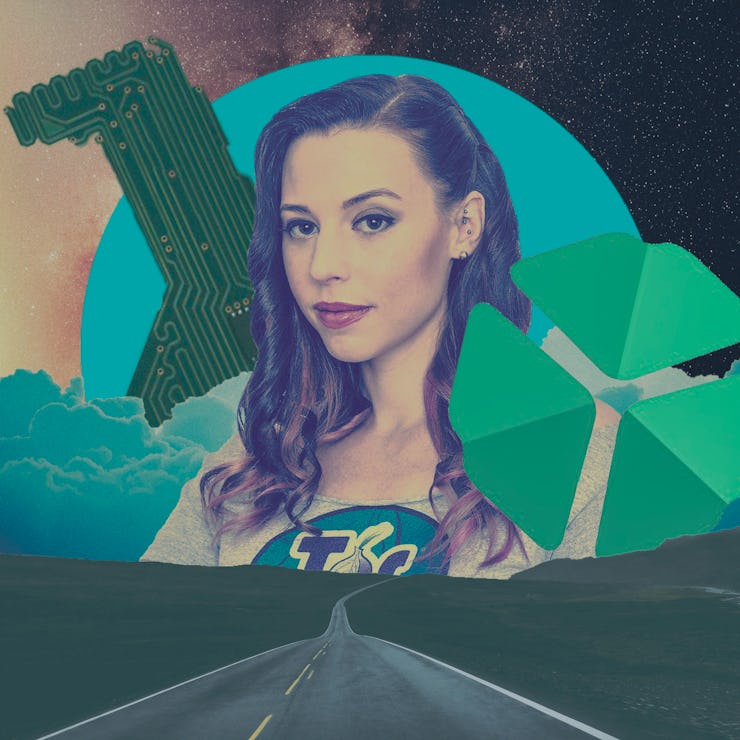What the Early Internet Taught Me About the Power of Creativity
"Company-building, application-building, infrastructure-building — all of this stuff — it is a creative act."

I’m the only member of my family with a technical background. My mother is an AP English teacher, my father teaches stage directing at a university, and my brother’s a Broadway actor. So basically, I’m the only one in the family who can balance a checkbook.
Growing up, people kept telling me, “You’re so creative,” and I assumed that meant that I was going to have a certain type of job — something in the arts. At the time, I wanted to be a screenwriter. Then I wanted to be a poet; I performed spoken word for a while and I still write as much as I can. I played guitar, sang, did musical theater … all the things. And I kept being told that was how I could be creative.
But I also started coding when I was 11 (in 1993), without any grownups having any idea what that was. It was fascinating to go on BBSes (old school forums) and talk to people — at that point, mostly academics. They didn’t know I was a little girl. That sounds weird now, but at the time, it was awesome to have the veil of anonymity. Ironically, it let me be myself.
See also: Amber Baldet Still Thinks the Blockchain Could Save Us All
In the real world, people dismissed me all the time. On the internet, I could have real conversations about things I thought were important. People assumed I was one of them, because most people online were like them. I was hidden, but I felt seen.
It’s important to be able to be anonymous for a number of reasons, but it’s also important to treat people like humans when they have chosen to reveal their identity. I’ve been involved in the fight for online privacy and the struggle between freedom and enforcement since I was a kid. I understand the arguments on both sides, about why we need privacy and why we need accountability, and living that experience informs why and how I build things every day.
"We could not only use more artists in technology but more recognition of the work of existing architects as artists. We need people who inspire others to make this world a place we want to live in."
It took me a long time to understand that the smart-guys-on-the-internet whom I idolized were just the next-generation inheritors of bias in academia and science — the first people on the networks weren’t those who were better than other people; they were just the people with access. They were smart, sure, but mostly they were just part of the same social graph.
Wait, weren’t we talking about creativity??
So, creativity is the ability to perceive this mass of chaos of the universe, where everything is happening all at once, and to pick out a single thread from all that. To give it context, narrative, and meaning. To not only be able to say, “This is the thing that I see in the chaos,” but to be able to share that view with other people in a way that they understand, too. In the best cases, people see themselves reflected back in what you share. They can build on it and make it more.
Being creative privately is important self-care, but to be able to successfully execute your idea in a public way, that’s a different sort of accomplishment. You can do it with paint, words, algorithms, or a team of engineers. Company-building, application-building, infrastructure-building — all of this stuff — it is a creative act, and I think we could not only use more artists in technology but more recognition of the work of existing architects as artists. We need people who inspire others to make this world a place we want to live in.
I occasionally get thrown in front of high schoolers, especially groups of girls and kids in STEM, and they’re like, “What’s your path? How did you navigate this?” And I have no idea. You can’t try to be somebody else. There’s no tried-and-true, “If you follow this rule book, then all of a sudden, you are going to be a successful person,” in any field, let alone technology.
I look at these efforts to “fix the pipeline problem” of under-represented people in tech and think, there’s no shortage of people interested in the world and with the smarts to contribute, but we get them here, and then we treat them like trash. Why would anyone want a career where they get to watch their peers advance year after year regardless of mediocre performance while their own progress feels like an American Gladiator obstacle run? It’s not rational.
It’s entirely ok to have a career in tech that’s about coming in, doing the job, and going home. Especially for people who are the first in their family to go to college, or who would rather spend their nights on side hustles. It’s fine for tech to be just a job. It’s not magic, it’s a paycheck.
But it’s also ok to see a simple code commit as an act of creation; to marvel at how the social and political impact of a viral tech product eclipses awareness of most traditional art these days. Create things that challenge the status quo, that help people think and behave differently. Let’s stop asking people if they’re technical enough and start asking them if they’re creative enough.
Amber Baldet is the co-founder and CEO of Clovyr, a new development framework making decentralization more accessible to everyone from hobbyists to enterprises. If people are still using the term “blockchain” in 10 years, it’ll be in no small part because of her. As told to James Dennin.
This interview has been lightly edited for clarity.